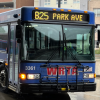Updated at 9 p.m.
Boston City Councilors heard testimony Monday on a proposed ordinance to create a new civilian police oversight board that would investigate allegations of police misconduct or improper use of force, and would hold police officers accountable for improper behavior.
The proposal, sponsored by Councilors Andrea Campbell, Ricardo Arroyo and Julia Mejia, would replace the existing Civilian Ombudsman Oversight Panel, better known as the “Co-op,” which has long been criticized as ineffective and toothless by advocates demanding more transparency in Boston policing.
Campbell, who called for the hearing, opened by noting the measure is about greater public accountability — not slamming the work of individual police officers — and with a less-than-subtle message of disapproval for Mayor Marty Walsh's administration for declining to provide a representative to testify at the hearing.
The Walsh administration did provide a letter to the Council committee that essentially defers on taking a position or otherwise commenting on the legislation while the Boston Police Task Force, appointed by Walsh in June, continues to prepare a report to the mayor on potential reforms to existing policies.
In a press availability later Tuesday, Walsh said he expects to receive the task force report by Thursday .
More Local News
Campbell called that justification disappointing.
“This step would be a big step in the city of Boston in transforming a board that has been ineffective in providing police accountability,” Campbell said. “Still, no one from the administration is here to actually weigh in, to take a position or to give feedback in real time.”
And, Campbell said, while she praises the work of the task force appointed by Walsh, action is overdue to address calls for a drastic overhaul of civilian review.
"The mayor has had numerous opportunities to partner with me and this body, as well as former Co-Op members, in order to make this happen," Campbell said. “It is sad that is has taken the death of George Floyd and others to get to this moment where we even have a task force.”
Co-sponsor Mejia shared Campbell’s disappointment with the Walsh administration’s response.
“Trust in government is at an all-time low, and sometimes for a good reason,” said Mejia, noting by way of example that “the administration has declined to be here today.”
“The fact that it took Goerge Floyd and the civil unrest, for you to say, ‘Ok, we’re going to do something about it now,’ — Where were you before?” asked Mejia.
“People have been calling for civilian review boards in cities around the country for as long as all of us have been alive,” Mejia said. “The question is what are we going to do about it.”
Whether the Council in fact has the power to create a new civilian police oversight board is questionable. In a 1987 ruling involving the City of Boston and the City Council, the Supreme Judicial Court of Massachusetts asserted that the mayor of Boston has full veto power over any Council actions involving the creation or reorganization of city departments or agencies.
According to the ruling, such a veto — unlike standard vetos — could not be overrruled, even by a super-majority of Council members.
On Tuesday, Council members heard testimony from several panels of witnesses, including from a member of New York City’s Civilian Complaint Review Board and a former member of the Boston Civilian Ombudsman Panel (Co-Op), who said that investigations into complaints of police misconduct often dragged on within the BPD’s Internal Affairs Department for years before coming to a formal finding that the Co-Op could review.
An analysis by GBH News found that in recent years, the BPD’s Internal Affairs department has taken more than 600 days, on average, to issue a finding regarding complaints of police misconduct.
More Local News
Ivan Espinoza-Madrigal, an attorney for the Boston-based legal assistance nonprofit Lawyers for Civil Rights, said the Ombudsman Panel’s reputation for being ineffective is widespread and justified.
“I want to be very clear: The process is confusing, it has no teeth, and at Lawyers for Civil Rights we have been repeatedly fielding phone calls and requests for more transparency” regarding the police force, Espinoza-Madrigal said.
The Council should overhaul or replace the Co-Op, Espinoza-Madrigal said, with a body that has subpoena power and the power to investigate cases and compile evidence.
“And it’s critical that appointments come from beyond the mayor’s office,” Espinoza-Madrigal said.
Meanwhile, to illustrate the failings of the current system, Espinoza-Madrigal described visiting the website for the Ombudsman Panel, hosted on the Boston Police Department’s website, and attempting to click on a link inviting users to submit police complaints.
“The link is broken,” Espinoza-Madrigal said, which GBH News verified was true. “Isn’t that symbolic?”
While several other Council members asserted support for creating a civilian police oversight board, others expressed concern and skepticism that there is a need to replace — rather than strengthen or leave alone — existing structures, including Councilor Frank Baker, who expressed concern over the cost of establishing a new civilian review board.
Councilor Lydia Edwards, who chaired the hearing, was among several Council members to express support for the idea of greater accountability without stating outright support for creating a new civilian review board.
But Edwards did push back on intimations that in examining the issue, the Council was stigmatizing police officers.
"This is not a quesiston of good or bad police," Edwards said. "This is a question about good or bad process."









